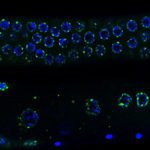Lien vers Pubmed [PMID] – 22920905
Curr Pharm Des 2013 ; 19(3): 377-86
Combating stress is one of the prime requirements for any organism. For parasitic microbes, stress levels are highest during the growth inside the host. Their survival depends on their ability to acclimatize and adapt to new environmental conditions. Robust cellular machinery for stress response is, therefore, both critical and essential especially for pathogenic microorganisms. Microbes have cleverly exploited stress proteins as virulence factors for pathogenesis in their hosts. Owing to its ability to sense and respond to the stress conditions, Heat shock protein 90 (Hsp90) is one of the key stress proteins utilized by parasitic microbes. There are growing evidences for the critical role played by Hsp90 in the growth of pathogenic organisms like Candida, Giardia, Plasmodium, Trypanosoma, and others. This review, therefore, explores potential of exploiting Hsp90 as a target for the treatment of infectious diseases. This molecular chaperone has already gained attention as an effective anti-cancer drug target. As a result, a lot of research has been done at laboratory, preclinical and clinical levels for several Hsp90 inhibitors as potential anti-cancer drugs. In addition, lot of data pertaining to toxicity studies, pharmacokinetics and pharmacodynamics studies, dosage regime, drug related toxicities, dose limiting toxicities as well as adverse drug reactions are available for Hsp90 inhibitors. Therefore, repurposing/ repositioning strategies are also being explored for these compounds which have gone through advanced stage clinical trials. This review presents a comprehensive summary of current status of development of Hsp90 as a drug target and its inhibitors as candidate anti-infectives. A particular emphasis is laid on the possibility of repositioning strategies coupled with pharmaceutical solutions required for fulfilling needs for ever growing pharmaceutical infectious disease market.

